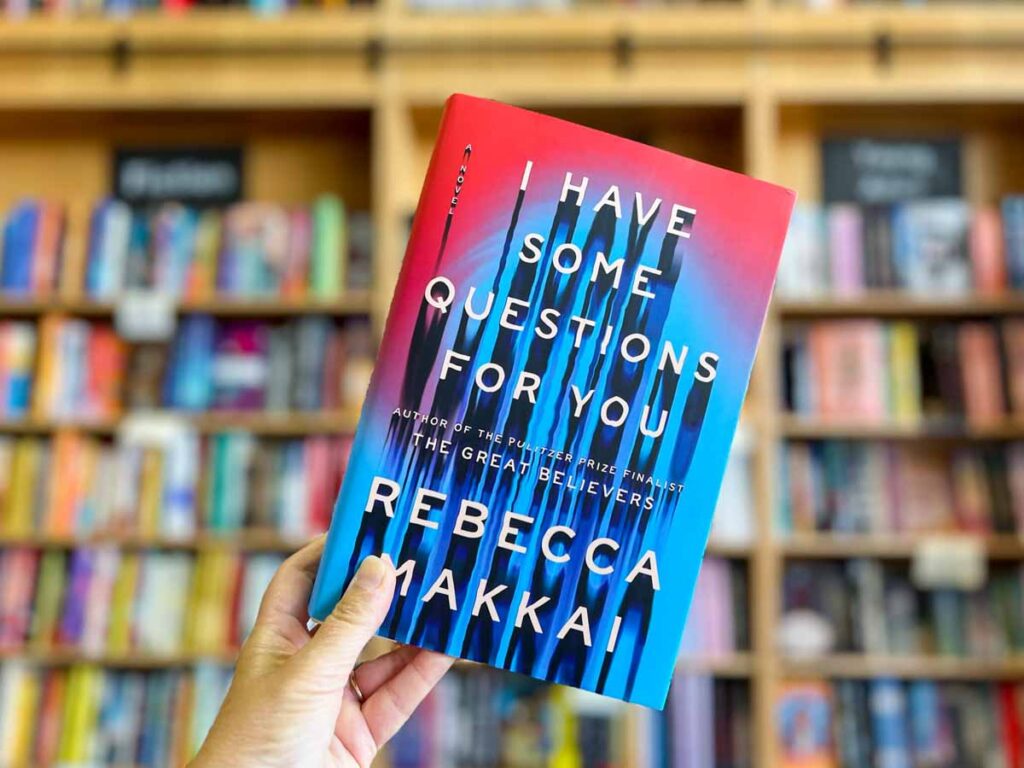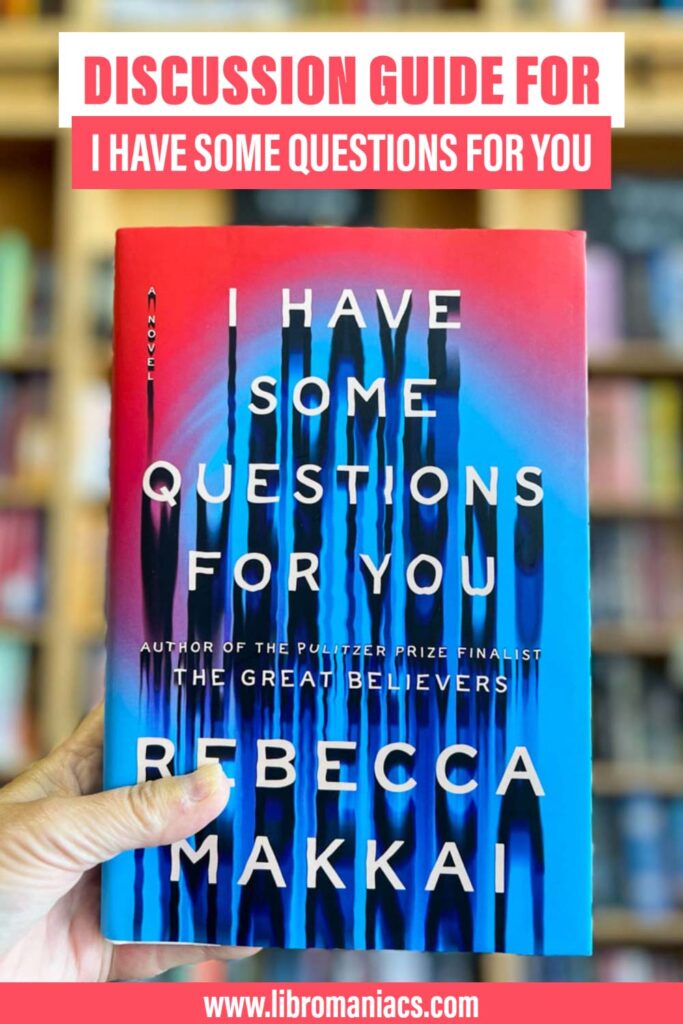Your book club will have plenty to discuss after reading I Have Some Questions for You. Bodie Kane is a true crime podcaster who returns to her boarding high school to teach a short course. One of her students ends up doing a project investigating the murder of Thalia Keith, Bodie’s roommate during her school years. The investigation brings up many questions which have been haunting Bodie. Was the conviction of the athletic trainer Omar fair? Was the trial conducted properly? And what other secrets are the students and teachers hiding from those years? Discuss all that and more with our I Have Some Questions for You book club questions.
Makkai’s book tackles some big questions, like the treatment of young women in our society, the criminal justice system, collective memory, and abuse. This I Have Some Questions for You discussion guide will help you engage in a lively discussion of these issues. Included is a book synopsis, selected reviews for more viewpoints, and 10 discussion prompts. If you are looking for some similar books to read, scroll down for our list of 3 related reads.

(This article contains affiliate links. This means that if you choose to purchase, I’ll make a small commission.)
I Have Some Questions for You Synopsis
(We always chose to provide the publisher synopsis because we feel that it’s worthwhile to discuss whether the official book description actually squared with your experience of the book.)
I Have Some Questions for You, Rebecca Makkai
A successful film professor and podcaster, Bodie Kane is content to forget her past—the family tragedy that marred her adolescence, her four largely miserable years at a New Hampshire boarding school, and the murder of her former roommate, Thalia Keith, in the spring of their senior year. Though the circumstances surrounding Thalia’s death and the conviction of the school’s athletic trainer, Omar Evans, are hotly debated online, Bodie prefers—needs—to let sleeping dogs lie.
But when the Granby School invites her back to teach a course, Bodie is inexorably drawn to the case and its increasingly apparent flaws. In their rush to convict Omar, did the school and the police overlook other suspects? Is the real killer still out there? As she falls down the very rabbit hole she was so determined to avoid, Bodie begins to wonder if she wasn’t as much of an outsider at Granby as she’d thought—if, perhaps, back in 1995, she knew something that might have held the key to solving the case.
In I Have Some Questions for You, award-winning author Rebecca Makkai has crafted her most irresistible novel yet: a stirring investigation into collective memory and a deeply felt examination of one woman’s reckoning with her past, with a transfixing mystery at its heart. Timely, hypnotic, and populated with a cast of unforgettable characters, I Have Some Questions for You is at once a compulsive page-turner and a literary triumph.
I Have Some Questions for You: Book Club Questions
These questions have been tailored to this book’s specific reading experience, but if you want more ideas, we also have an article with 101 generic book club questions.
- This book touches on many subjects facing women today– relationships, motherhood, harassment, and bias– just to name a few. Which of these subjects resonated with you?
- What did you think of the author’s device of having Bodie “speaking” to Mr. Bloch in the narration?
- “For a teenager, being seen a certain way is as good as being that way—and soon your vision becomes part of my self-image.”
Bodie and the other characters from her class look back on their time at school in a variety of ways. How do you think the experience of being young differs from reflections on it later in life? How did your peers shape your self-image?
- What do you think about Bodie’s struggles with the accusations against her ex-husband, and also her realization regarding Mr. Bloch’s actions when they were young? How do individuals and society decide what behavior deserves reproach and what doesn’t?
- “Wasn’t it the one where she was stabbed in — no. The one where she got in a cab with — different girl. The one where she went to the frat party, the one where he used a stick, the one where he used a hammer, the one where she picked him up from rehab and he — no. The one where he’d been watching her jog every day? The one where she made the mistake of telling him her period was late? The one with the uncle? Wait, the other one with the uncle?”
What did you think of the commentaries like this on violence against women. How about the way it’s portrayed in the media, or in our collective remembrance?
- What do you think about the ending? Do you think Omar will be released and the true killer brought to justice?
- “The hell of imprisonment isn’t the terrible food, it’s the lack of choice of food. It isn’t the cold, wet floor, it’s that you can’t choose another place to stand. It isn’t the confinement so much as the fact of never running, never getting in your car and speeding off, as Omar loved to do.”
What do you think of the way the criminal justice system is portrayed in this book?
- At the center of the story is a whodunit that circles around who murdered Thalia Keith. There are many twists and turns as Bodie uncovers evidence. While you were reading, who did you think was the killer? Were you surprised by the ultimate revelation?
- How does the setting at the Granby boarding school add to the discussion surrounding class and privilege? How did class and privilege affect the investigation?
- At 448 pages, this is not a short read. How did the book length work for you. And what do you think about the frequent switches in time?
Selected Reviews for I Have Some Questions for You
“Makkai uses her story to ponder framing, narratives, and preconceptions – what better place to illuminate the repercussions of how stories are crafted than in literary fiction? Young Bodie was an outsider at Granby who has lived through trauma and didn’t have the status and habitus of the other students – Makkai shows the social dynamics at play, between classes and genders. The same goes for the discussion about Jerome, the husband – here, Makkai asks uncomfortable questions about the instrumentalization of victim narratives in order to gain status and attention […] Makkai has also inserted several references to real-life femicides, raising awareness on how they are perceived and what that means.”
“All the issues I have with I Have Some Questions For You boil down to the fact that it was just an incredibly shallow novel–and not just a shallow novel, but a shallow novel that thought it was being so incredibly deep […] It was unexceptional, messy, underwhelming, and frustrating. Needless to say, it did not live up to the hype for me.”
“I often find that Literary Fiction books focus on social issues, but this one felt like it was trying to hit upon far too many. Gender norms, racism, me too era, covid, the justice system, misogyny, cancel culture, sexual assault, predatory behavior and more, yes more! I think this would have been more effective if the author had focused on a few of these issues and really dug in and analyzed and challenged what could be done about them, or how the full impact of each is felt.”
“… this structure allows her to raise the more interesting ideas things she really wants convey: #metoo, race, classism, cancel culture. And most of all: can we learn something about ourselves and our prejudices when we look back at the past with our modern post-me-too and BLM eyes? And is there a risk we are replacing one set of prejudices with another?”
3 Books Like I Have Some Questions for You
If you are keen on more murder mysteries and courtroom scenes, check out our discussion guide for The Maid, which features a neurodivergent hotel maid caught up in some nefarious doings.
For more on the devastating effects of incarceration, try our guide for An American Marriage or Chain Gang All-Stars. A Flicker in the Dark and The House in the Pines are also a good comp for a murdery whodunnit featuring kids and the “look back” from the distance of time.
Here are three more related reads for you:

My Last Innocent Year, Daisy Alpert Florin
My Last Innocent Year focuses on Isabel Rosen, a senior at Wilder College in 1998. It’s a coming of age novel as Isabel experiences love, betrayal, and regret through a non-consensual sexual encounter with a fellow student, and a consensual affair with a married professor. Isabel comes into her own, having to reckon with her choices and what it means to be an artist and a woman

On the Savage Side, Tiffany McDaniel
McDaniel delivers a powerful literary thriller focusing on twin sisters Arcade and Daffodil, who live in an Ohio town where women keep mysteriously disappearing. Their lives have been exceptionally difficult, raised by an addict mother and aunt who were also prostitutes. And as they grow up they fall into the same toxic patterns. Through Arcade’s remembrances to the safe spaces of their childhood with their imaginations and their kind grandmother, to Arcade’s present day determination to protect Daffodil and evade the killer, McDaniels weaves a heartbreaking and deep story inspired by the true disappearance of the Chillicothe Six.

Never Saw Me Coming, Vera Kurian
A page turning thriller about Chloe Sevre, one of 7 students participating in an unusual psychopath study at her college. Chloe is focused on exacting revenge on a former childhood acquaintance who harmed her, but is thrown off track when members of the psychopath study start turning up murdered. Now Chloe is trying to find out who is trying to kill her and the other students, while putting her own devious plan into action.
Have a listen on Audible. Try audio books for free for 30 days.
Share these I Have Some Questions for You book club questions with your friends:

